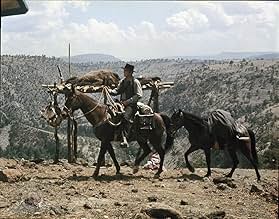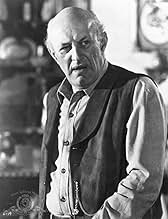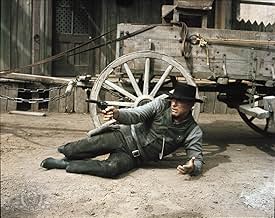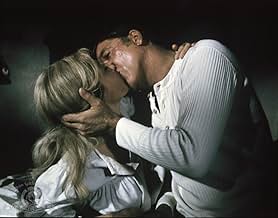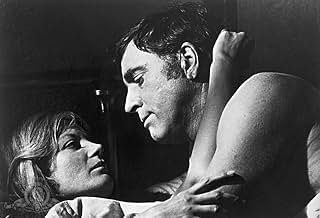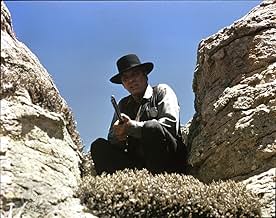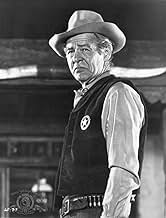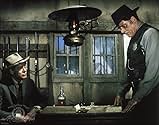IMDb-BEWERTUNG
7,0/10
6612
IHRE BEWERTUNG
Ein Gesetzeshüter aus Bannock kommt in Sabbat an, um alle Viehzüchter festzunehmen, deren wilde Feier im Jahr zuvor zum Unfalltod eines alten Mannes führte.Ein Gesetzeshüter aus Bannock kommt in Sabbat an, um alle Viehzüchter festzunehmen, deren wilde Feier im Jahr zuvor zum Unfalltod eines alten Mannes führte.Ein Gesetzeshüter aus Bannock kommt in Sabbat an, um alle Viehzüchter festzunehmen, deren wilde Feier im Jahr zuvor zum Unfalltod eines alten Mannes führte.
William Watson
- Choctaw Lee
- (as William C. Watson)
Empfohlene Bewertungen
This is perhaps the best of those enigmatic Michael Winner productions that focus the plot on the emotions and personalities of the protagonists of the film. I love Michael Winner productions. They are never shot in a studio; and his realism is virtually unapproachable by any other director of the time.
Lawman is a story of pride,arrogance and people fixed into paths of life which they cannot change. Burt Lancaster is sterling representing "The Law"; a force that cannot be swayed. He desires, or thinks he desires, to be something else, but he is indeed the law, and cannot escape his fate. The characters of the town, the men he comes to arrest for a killing, all follow their own ordained paths. Because not one of them can, or will, bend or accept the events that are occurring, they all converge on the final climax that is one of the greatest statements of human futility that I have ever seen in a film. The climax of this story is fantastic, and almost totally unexpected. No one should spoil it for you, even a little.
There are a number of truly great character actors in this film, and each gives a flawless performance. In True Michael Winner form, the action is stunning and the violence is portrayed with all the realism that shows how awful and devastating it can be. This is a gritty, but deep story that holds one in its grasp without pause. I highly recommend it.
Unfortunately, Lawman is a rare film; almost never broadcast. If you are fortunate enough to find a copy for rent,or purchase, do so with all haste. It's a Winner!
Lawman is a story of pride,arrogance and people fixed into paths of life which they cannot change. Burt Lancaster is sterling representing "The Law"; a force that cannot be swayed. He desires, or thinks he desires, to be something else, but he is indeed the law, and cannot escape his fate. The characters of the town, the men he comes to arrest for a killing, all follow their own ordained paths. Because not one of them can, or will, bend or accept the events that are occurring, they all converge on the final climax that is one of the greatest statements of human futility that I have ever seen in a film. The climax of this story is fantastic, and almost totally unexpected. No one should spoil it for you, even a little.
There are a number of truly great character actors in this film, and each gives a flawless performance. In True Michael Winner form, the action is stunning and the violence is portrayed with all the realism that shows how awful and devastating it can be. This is a gritty, but deep story that holds one in its grasp without pause. I highly recommend it.
Unfortunately, Lawman is a rare film; almost never broadcast. If you are fortunate enough to find a copy for rent,or purchase, do so with all haste. It's a Winner!
It's crazy the way some films get labeled "brilliant" while others get ignored just because of bad timing or poor studio backing or any # of things.
I'm not a fan of Westerns. I don't consider this a Western. I consider it a wonderfully written, directed, and acted work of art.
Gerald Wilson's script, and its interpretation by the three leads, is so skillful that it functions almost as a poem on the themes of "man," "animal," "law," and euphemism.
Micheal Winner's direction is beyond good. Every cut--early on he uses many overlays, then as the film builds he uses jarring smash cuts--is breathtaking in its thoughtfulness and thematic effect. And he knows when to lay off the music. An eerily quiet early showdown scene with Burt Lancaster, Albert Salmi, and Richard Jordan (with Robert Ryan in the background) is probably the most creative and effective such scene I've ever witnessed, Leone notwithstanding.
Then there's the acting. Lancaster is THE great underrated American actor, and it's because so many of his best performances came after he'd turned 50. I truly think this is his best. He says so much with his eyes, and especially with a tiny flutter or break in his voice. The range he achieves within this supposedly rigid character is phenomenal. From the knockout first scene between him and Ryan, to the touching scenes between him and Sheree North--you'll never see a sadder face than his when North gets out of the bed--to the scene by the river with Jordan, he creates a full character simply by being a great actor. No gimmicks or wackiness. He just out-acts anyone on the screen today.
Ryan equals Burt's performance. This is the best of the ten or so Ryan performances I've seen. Like Lancaster as he aged, Ryan is unafraid to play an aging, weakening character. Seeing him come to life briefly when he takes on a "Bronson man" is thrilling.
Lee J. Cobb has less to do but does a heck of a lot with it. The supporting actors are, to a person, superb. But special kudos must go to Richard Jordan.
This is a film that challenges the macho stereotype and finds it wanting. Lancaster's character offers a complex alternative. An absolute must-see. Tremendous script, unparalleled acting, superb directing. Oh, and the locations are just breathtaking. It's criminal that there's no true widescreen of Lawman available. Anyway, SEE IT.
I'm not a fan of Westerns. I don't consider this a Western. I consider it a wonderfully written, directed, and acted work of art.
Gerald Wilson's script, and its interpretation by the three leads, is so skillful that it functions almost as a poem on the themes of "man," "animal," "law," and euphemism.
Micheal Winner's direction is beyond good. Every cut--early on he uses many overlays, then as the film builds he uses jarring smash cuts--is breathtaking in its thoughtfulness and thematic effect. And he knows when to lay off the music. An eerily quiet early showdown scene with Burt Lancaster, Albert Salmi, and Richard Jordan (with Robert Ryan in the background) is probably the most creative and effective such scene I've ever witnessed, Leone notwithstanding.
Then there's the acting. Lancaster is THE great underrated American actor, and it's because so many of his best performances came after he'd turned 50. I truly think this is his best. He says so much with his eyes, and especially with a tiny flutter or break in his voice. The range he achieves within this supposedly rigid character is phenomenal. From the knockout first scene between him and Ryan, to the touching scenes between him and Sheree North--you'll never see a sadder face than his when North gets out of the bed--to the scene by the river with Jordan, he creates a full character simply by being a great actor. No gimmicks or wackiness. He just out-acts anyone on the screen today.
Ryan equals Burt's performance. This is the best of the ten or so Ryan performances I've seen. Like Lancaster as he aged, Ryan is unafraid to play an aging, weakening character. Seeing him come to life briefly when he takes on a "Bronson man" is thrilling.
Lee J. Cobb has less to do but does a heck of a lot with it. The supporting actors are, to a person, superb. But special kudos must go to Richard Jordan.
This is a film that challenges the macho stereotype and finds it wanting. Lancaster's character offers a complex alternative. An absolute must-see. Tremendous script, unparalleled acting, superb directing. Oh, and the locations are just breathtaking. It's criminal that there's no true widescreen of Lawman available. Anyway, SEE IT.
I rather feel the original "review" on the database misses the point of this dark film. The notion that the community is best served by a rigid, inflexible determination to enforce the letter of the law under all circumstances is indeed the view espoused by the film's main character (played with consummate skill by Burt Lancaster) but the message of the film is surely to point out the limitations of such a view.
Towards the end of the film the Marshall is offered another vision - of a life that contain more than the vendetta, the manhunt, and the inevitable killing that follows. Instead he is tempted by the possibility of a life that offers love, humanity and peace. Unable to change his spots, however, he deliberately throws all that away in a final, senseless act of violence when he shoots in the back a frightened and basically harmless man who is trying to run away - a senseless, brutal and completely unnecessary act of judicial murder. It bears a great resemblance in fact to Harry's similar cold-blooded and pointless execution of his terrorist fugitive at the end of "Harry's Game" and similarly to that, its effect is to arouse disgust at the perpetrator and to alienate our sympathies from what we had previously felt was the "right" side, and to question whether it had really been so "right" all along. The purpose, one feels, of this final killing was not because there was any need for it, but simply to demonstrate the Marshall's defiance of his critics and his determination to continue in the path he had previously followed.
To my mind the film is an intelligent critique of the whole notion of the missionary self-righteousness of this attitude that can arise among self-appointed guardians of the public good, whose original high standards and pure motives are eroded by the violence and the basic inhumanity of the methods they use until they become - as Burt Lancaster actually states in specific terms during the film - just people who are good at killing other people. Siilar themes were explored earlier in "The Searchers" (1956) and "Hang 'em High" (1968) and later in "Unforgiven" (1992) but the message was best expressed to my mind by Peter Shaffer n his play "The Royal Hunt of the Sun" where the young, idealistic but inexperienced squire, Martin, tells his master the conquistador Pizzarro how he feels that a "noble reason" can make the violence of war "glorious". Pizzarro replies: "Give me one reason that stays noble once you start hacking off limbs in its name".
Towards the end of the film the Marshall is offered another vision - of a life that contain more than the vendetta, the manhunt, and the inevitable killing that follows. Instead he is tempted by the possibility of a life that offers love, humanity and peace. Unable to change his spots, however, he deliberately throws all that away in a final, senseless act of violence when he shoots in the back a frightened and basically harmless man who is trying to run away - a senseless, brutal and completely unnecessary act of judicial murder. It bears a great resemblance in fact to Harry's similar cold-blooded and pointless execution of his terrorist fugitive at the end of "Harry's Game" and similarly to that, its effect is to arouse disgust at the perpetrator and to alienate our sympathies from what we had previously felt was the "right" side, and to question whether it had really been so "right" all along. The purpose, one feels, of this final killing was not because there was any need for it, but simply to demonstrate the Marshall's defiance of his critics and his determination to continue in the path he had previously followed.
To my mind the film is an intelligent critique of the whole notion of the missionary self-righteousness of this attitude that can arise among self-appointed guardians of the public good, whose original high standards and pure motives are eroded by the violence and the basic inhumanity of the methods they use until they become - as Burt Lancaster actually states in specific terms during the film - just people who are good at killing other people. Siilar themes were explored earlier in "The Searchers" (1956) and "Hang 'em High" (1968) and later in "Unforgiven" (1992) but the message was best expressed to my mind by Peter Shaffer n his play "The Royal Hunt of the Sun" where the young, idealistic but inexperienced squire, Martin, tells his master the conquistador Pizzarro how he feels that a "noble reason" can make the violence of war "glorious". Pizzarro replies: "Give me one reason that stays noble once you start hacking off limbs in its name".
Michael Winner's "The Lawman" reveals that a sheriff - traditional officer responsible for law and order, symbol of virtue and right - is 'not' always morally excellent and virtuous or that his prey thoroughly bad...
Burt Lancaster is cast as a merciless avenger, unmoved by love or pity, determined to one end: Exterminate the opposition...
The criminals here are, in fact, some law breakers, drunken cowboys - who by bad luck - have killed an old man during a rough enthusiastic drinking bout...
Lancaster - blind to his faults, unwilling to judge or to be less severe, and with no intention to arrest - hunts his prey down, one by one, until the last man...
There is no poetic eloquence here, no tension as the two protagonists walk slowly towards their duel, no feeling that right is victorious, no good has conquered evil, no decisive clash to capture the audience's imagination... This is pure brutality: Gratuitous graphic sequences - sickening and revolting - of destroyed shoulders and collapsed faces... Uncalled details of death that may damage the sonorous knell of the 'classic Western' with its ideal behavior and precise rules traditionally observed...
The Western showdown is strictly ritual, quick, clean and purely emotional... The outcome predictable... The moment of suspense exciting as anything the cinema has ever produced...
The showdown in "The Lawman" is disturbing in the way of vision... It follows on in the tradition of Palance/Elisha Cook Jr. ultimate confrontation in "Shane," and excels Sam Peckinpah's commitment to an ideal of self-expression through violent death... It may well mean that a film like "Shane," "High Noon," "Vera Cruz," or "The Fastest Gun Alive," can never be made again...
Burt Lancaster is cast as a merciless avenger, unmoved by love or pity, determined to one end: Exterminate the opposition...
The criminals here are, in fact, some law breakers, drunken cowboys - who by bad luck - have killed an old man during a rough enthusiastic drinking bout...
Lancaster - blind to his faults, unwilling to judge or to be less severe, and with no intention to arrest - hunts his prey down, one by one, until the last man...
There is no poetic eloquence here, no tension as the two protagonists walk slowly towards their duel, no feeling that right is victorious, no good has conquered evil, no decisive clash to capture the audience's imagination... This is pure brutality: Gratuitous graphic sequences - sickening and revolting - of destroyed shoulders and collapsed faces... Uncalled details of death that may damage the sonorous knell of the 'classic Western' with its ideal behavior and precise rules traditionally observed...
The Western showdown is strictly ritual, quick, clean and purely emotional... The outcome predictable... The moment of suspense exciting as anything the cinema has ever produced...
The showdown in "The Lawman" is disturbing in the way of vision... It follows on in the tradition of Palance/Elisha Cook Jr. ultimate confrontation in "Shane," and excels Sam Peckinpah's commitment to an ideal of self-expression through violent death... It may well mean that a film like "Shane," "High Noon," "Vera Cruz," or "The Fastest Gun Alive," can never be made again...
Lawman is directed by Michael Winner and written by Gerry Wilson. It stars Burt Lancaster, Robert Ryan, Lee J. Cobb, Robert Duvall, Sheree North and Richard Jordan. Music is by Jerry Fielding and cinematography by Robert Paynter.
The Lawman of the title is Jared Maddox (Lancaster), who arrives in the town of Sabbath to serve warrants on the group of rowdies responsible for the death of an old man. His cold hearted approach to his work, however, doesn't endear him to the townsfolk.
A man gets caught in his own doing. Can't change what you are, and if you try, something always calls you back.
Traditional Western that deals in the conflict between law and justice, Lawman, like the leading man, broods significantly. The overriding theme of if Maddox's enforcement of the law justify's the means, is tailor made for Winner's affinity for all things vengeance flavoured. Violence is not in short supply, the director gleefully keeping things gory, and the characterisations of the principal players are smartly complex. The excellent cast turn in equally great performances, the Durango locales are beautifully utilised by Winner and Paynter, and the production design is grade "A" quality.
It's an anti-backlash movie of some substance, where spicy and thoughtful dialogue comes forth from the mouths of deftly shaded characters. Highly recommended to Adult Western fans. 8/10
The Lawman of the title is Jared Maddox (Lancaster), who arrives in the town of Sabbath to serve warrants on the group of rowdies responsible for the death of an old man. His cold hearted approach to his work, however, doesn't endear him to the townsfolk.
A man gets caught in his own doing. Can't change what you are, and if you try, something always calls you back.
Traditional Western that deals in the conflict between law and justice, Lawman, like the leading man, broods significantly. The overriding theme of if Maddox's enforcement of the law justify's the means, is tailor made for Winner's affinity for all things vengeance flavoured. Violence is not in short supply, the director gleefully keeping things gory, and the characterisations of the principal players are smartly complex. The excellent cast turn in equally great performances, the Durango locales are beautifully utilised by Winner and Paynter, and the production design is grade "A" quality.
It's an anti-backlash movie of some substance, where spicy and thoughtful dialogue comes forth from the mouths of deftly shaded characters. Highly recommended to Adult Western fans. 8/10
Wusstest du schon
- WissenswertesSome scenes were shot in the same Western location town as Howard Hawks's final film, Rio Lobo (1970). Michael Winner says in his autobiography that the crews of both films met in the middle of the town, as in a Western showdown, but without guns.
- PatzerWhen Maddox (Burt Lancaster) shoots the horse out from under Vernon Adams (Robert Duvall), the man who is thrown from the falling horse has a full head of hair, and is clearly a stunt double. Robert Duvall was totally bald on top in this movie. The stuntman even tries to hide the fact by placing his hand right on top of his head as he comes up, but the full head of hair is still visible.
- Zitate
Bannock Marshal Jared Maddox: I remember you at Fort Bliss.
Sabbath Marshal Cotton Ryan: That's my trouble. Everybody remembers me at Fort Bliss.
- Alternative VersionenAll UK video versions are cut by 4 secs to remove a cruel horse-fall.
- VerbindungenFeatured in Sven Uslings Bio: Lawman (2019)
Top-Auswahl
Melde dich zum Bewerten an und greife auf die Watchlist für personalisierte Empfehlungen zu.
- How long is Lawman?Powered by Alexa
Details
Box Office
- Bruttoertrag in den USA und Kanada
- 5.940.000 $
- Laufzeit1 Stunde 39 Minuten
- Farbe
- Seitenverhältnis
- 1.85 : 1
Zu dieser Seite beitragen
Bearbeitung vorschlagen oder fehlenden Inhalt hinzufügen



